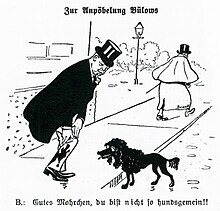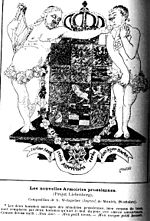Eulenburg affair
"[1] The issue centred on journalist Maximilian Harden's accusations of homosexual conduct between the Kaiser's close friend Philipp, Prince of Eulenburg, and General Kuno von Moltke.Historians have linked the aftermath of the affair to the changes in German foreign policy that heightened its military aggression and ultimately contributed to World War I.[3][4] Like many others, Bismarck noticed that the nature of the relationship between Wilhelm II and Eulenburg could "not be confided to paper" and felt, alongside those others, that even these activities in the private sphere were not to be exposed to the public.[3] Beyond that, the Auswärtiges Amt suffered what the British historian John C. G. Röhl called a "culture of intrigue" with German diplomats forever forming factions to plot against one another.Wilhelm II, informed of the growing story, responded by requiring the resignation of three of fifteen prominent aristocrats, Hohenau, Moltke, and Count Johannes von Lynar, listed as homosexual by the Berlin vice squad; however, the actual list, not shown to Wilhelm II, contained several hundred names.Elbe described the lack of conjugal relations, happening only on the first and second night of their marriage, Moltke's overly close friendship with Eulenburg with whom he was always spending too much time, and her ignorance of homosexuality.Adolf Brand, founder of the first homosexual periodical, Der Eigene (The Unique), had printed a pamphlet which described how Bülow had been blackmailed for his sexuality and had kissed and embraced his private secretary Max Scheefer at male gatherings hosted by Eulenburg, and thus was morally obliged to publicly oppose Paragraph 175 .Elbe, through a diagnosis of classical hysteria, and Hirschfeld, by retracting his earlier testimony, were discredited and Harden was convicted of libel and sentenced to four months imprisonment.[3] In November 1908, the chief of the Military Secretariat Dietrich von Hülsen-Haeseler died of a heart attack while performing a pas seul dressed in a woman's ballet tutu for Wilhelm II and his hunting party, requiring further damage control in the form of a cover up.[3] Harden, like some in the upper echelons of the military and Foreign Office, resented Eulenburg's approval of the Anglo-French Entente, and also his encouragement of Wilhelm to rule personally.





Philipp, Prince of EulenburghomosexualKaiser Wilhelm IIMaximilian HardenKuno von MoltkeImperial GermanyOscar WildeWorld War IOtto von BismarckRealpolitikWeltpolitikAuswärtiges AmtJohn C. G. RöhlFriedrich von HolsteinBernhard von BülowDie ZukunftViennaAlgeciras ConferenceMoroccoSwitzerlandGardes du CorpsLieutenant GeneralWilhelm Graf von HohenauOrder of the Black EagleFriedrich Heinrich of PrussiaOrder of Saint JohnWilhelm II of GermanyKuno Graf von MoltkeParagraph 175Königliche OperequerryImperial ChancellorBernhard Prince von BülowMagnus HirschfeldKladderadatschAdolf BrandDer Eigenepamphlethysteriahush moneyperjurycoat of arms of PrussiaDietrich von Hülsen-Haeselerpas seulballet tutuanti-homosexuality sentimentDaily Telegraph AffairLGBT rights in GermanyRöhm scandalGay Nazis mythFrankfurt homosexual trialsPersecution of homosexuals in Nazi GermanyGermanDreadnought (book)HistoryKrupp affairFirst homosexual movementInstitut für SexualwissenschaftScientific-Humanitarian CommitteePoliticiansTranssexuals ActNight of the Long KnivesvictimsBlomberg–Fritsch affairThe Malicious Practices Act 1933Lesbians in Nazi GermanyRightsIntersexRecognition of same-sex unionsTransgenderThird gender lawSelf-Determination ActCentrum Schwule GeschichteSchwules MuseumHirschfeld Eddy FoundationLesbenringGerman Society for Social-Scientific Sexuality ResearchMotzstraßeNollendorfplatzSt. Georg, HamburgFrankfurter EngelMemorial to Homosexuals persecuted under NazismMemorial to gay and lesbian victims of National SocialismMemorial to the first homosexual emancipation movementDU&ICHHinnerkMännerSiegessäuleTabu HomosexualitätDifferent from the OthersDie FreundinPlanetRomeo
